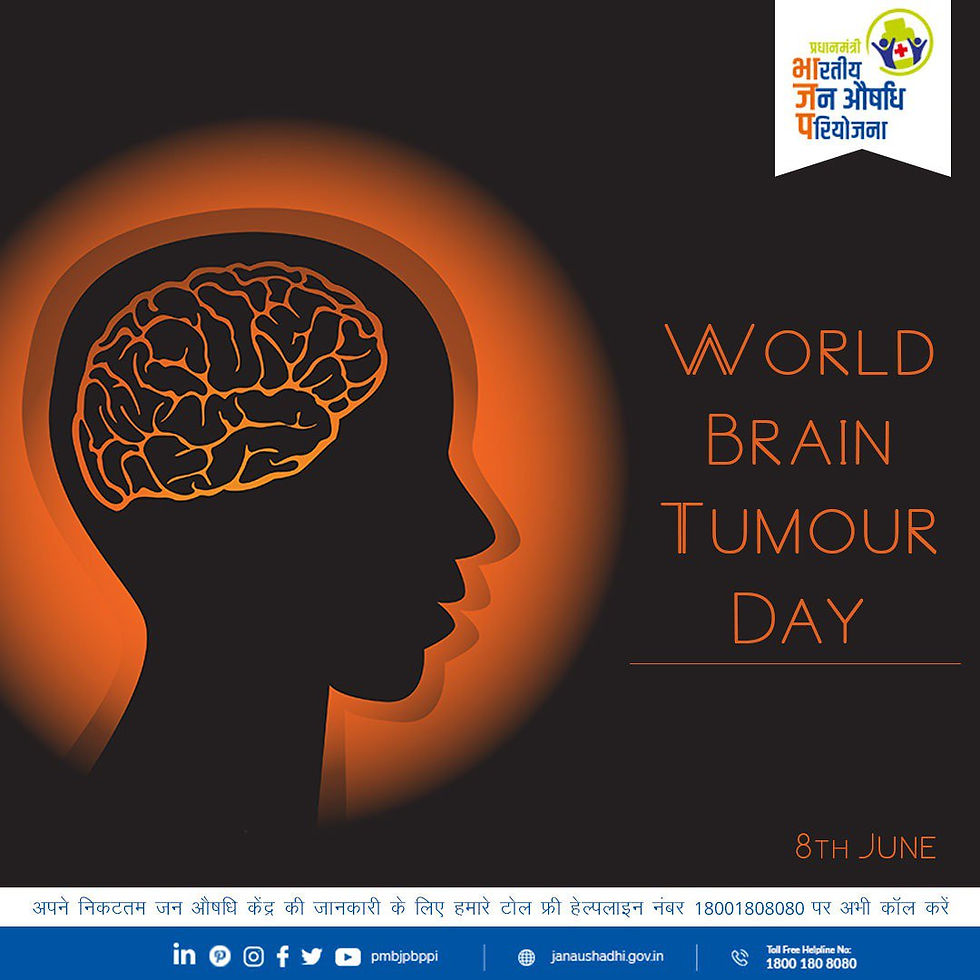World Brain Tumour Day 2019
- Sanjay Trivedi
- Jun 8, 2019
- 2 min read

The average survival rate for all malignant brain tumor patients is only 35%. It is important to identify the early symptoms of brain tumor and consult a doctor immediately. This World Brain Tumor Day we aim to raise awareness about this rare type of cancer.
World brain tumour day is observed on 8th of June every year since 2000. This daywas first observed by German Brain Tumour Association (Deutsche Hirntumorhilfe e.V.). This is a non-profit organisation which raises public awareness and educates people about brain tumour. The incidence of central nervous system (CNS) tumors in India ranges from 5 to 10 per 100,000 population with an increasing trend.Metastatic brain tumors occur when cancer located in another organ of the body spreads to the brain.40% of all cancers spread to brain.Brain and central nervous system tumors are also the second most common cancers in children, accounts for about 26% of childhood cancers.
Government of India has introduced National Programme for Prevention and Control of Cancer, Diabetes, Cardiovascular diseases & Stroke with the objectives of prevention, screening, early detection, diagnosis and treatment including palliative care in end stagefor the major non communicable diseases.
What is Brain Tumour?
Unnecessary growth of cells when body doesn’t require them is known as tumour. A brain tumour occurs when abnormal cellsare produced within any part of brain. There are two main types of tumours namely, malignant and benign(nonmalignant)tumours. Benign brain tumors are non-cancerous, while malignant primary brain tumors are cancerous. Most of the brain tumors are non-cancerous and less than one-third of brain tumors are cancerous. Brain tumour can occur at any age.
The exact cause of brain tumour is not clear but the most well-known environmental risk factor for the development of brain tumours is exposure to radiation, especially due to previous cancer treatment.
The symptoms of brain tumour depend on their size, type, and location.
The most common type of primary brain tumour among adults are astrocytoma, meningioma, and oligodendroglioma.
The most common type of primary brain tumours in children are medulloblastoma, grade I or II astrocytoma, (or glioma) ependymoma, and brain stem glioma.
Family history and high dose X-rays are risk factors for brain tumour.
Brain tumours are diagnosed by the doctor based on the results of a medical history and physical examination and various specialized tests of the brain and nervous system.
Brain tumours kill more children and adults under the age of 40 than any other cancer.
What are the symptoms of brain tumour? The brain tumours may produce symptoms that vary depending on the part of the brain they begin. Some common symptoms are headaches, seizures, problem with vision, vomiting, and mental changes. Patient may feel headache and vomiting in the morning. More specific problems may include difficulty in walking, speaking and sensation.
What are the available treatments for Brain tumour?
Doctors may suggest following treatments according to their type, grade, and position of tumour and general health of patient.
Surgery
Radiotherapy
Chemotherapy
Steroids
Anti-seizure medication
Ventricular peritoneal shunt







Comments